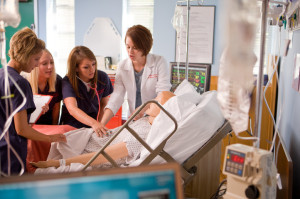Overview of Clinical Decision Making in Nursing
Clinical decision making is a critical skill for every nurse working in a medical facility. Nursing requires critical thinking skills and immediate decision making skills based on the situation. When a nurse is not able to make decisions about patient care, it can result in severe consequences. A clinical setting requires a nurse to make choices about the needs of patients and speak up about those needs as quickly as possible to avoid complications.
Basics of Decision Making in Clinical Practice
While a nurse is not the only medical professional making decisions about patient health, nursing requires critical thinking skills and decision making skills to properly support a medical doctor. The basics of clinical decision making are the foundation of vital nursing skills that are applied at every level of health care.
According to the University of California at San Diego, clinical decision making is a process that nurses and doctors apply to various situations. It is about determining what a patient needs based on the situation and when the patient will need the particular healthcare service.
Depending on the clinical setting, a nurse may or may not be responsible for the majority of decisions. In most cases, a nurse will provide minor medical services while waiting for a physician to make a final diagnosis and provide the decision about the next step of patient care.
In nursing, the decision making process is primarily related to representing the needs and requests of patients. A physician may not always have the time to provide all of the care a patient needs, so a nurse must make decisions based on the diagnosis of a doctor and any directions provided to help improve the comfort level of a patient.
Gaining Knowledge to Make Educated Choices
Clinical decision making is a vital part of nursing because a doctor is not always available to provide immediate care. Nurses will need to understand the situation and sometimes make instant decisions about the appropriate treatment to stabilize or help a patient until a physician can provide services.
According to Ida Torunn Bjork and Glenys A. Hamilton on Hindawi.com, a nurse must have a broad knowledge base related to healthcare services and the potential complications of different actions. Without a broad base to draw from, it is difficult to make educated or sound decisions about a patient’s immediate healthcare needs.
In clinical practice, a nurse can find that most situations arise that require fast decision making skills. Gaining knowledge starts with the basic education every registered nurse is expected to learn. Unfortunately, the educational standards only provide the foundation for healthcare services. Since nurses also make decisions about communication, policies and intervention, knowledge must consider other facets of working with patients or other healthcare professionals.
According to Dr. Maria Muller-Staub on Nanda.org, nurses must apply diagnostic skills with the therapeutic reasons for actions and the best ethical choice based on the individual situation. By using a combination of diagnosis, ethics and possible therapies, a nurse can make sound decisions about patient health and wellness.
Applying Decision Making Skills
After gaining a broad base of information based on experience, education and research into possible solutions, a nurse is able to apply critical thinking skills to any situation. According to NursingTimes.net, using evidence and experience to make a decision helps reduce the uncertainty of a decision.
Applying the critical thinking skills and decision making skills to a clinical practice is the responsibility of a nurse. It is sometimes necessary to make immediate choices and then apply the decision to the situation to provide better patient care services. A nurse is responsible for the health of patients under his or her care, which means it is necessary to make choices based on the needs of the patient.
Clinical decision making is about the health of patients, the ethical solutions to the problems that arise and the research that provides possible answers. A nurse must gain knowledge about several areas of study and then apply the information to appropriate situations as problems arise.






